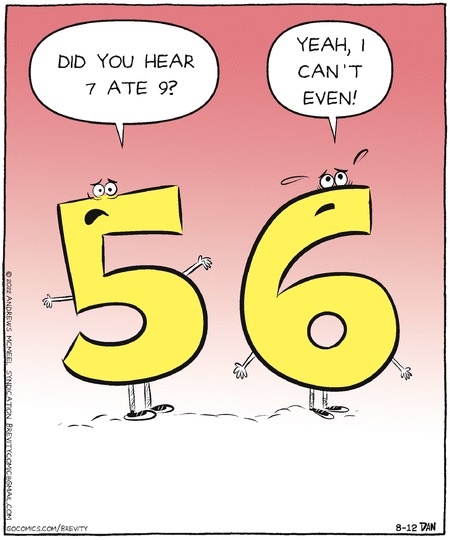The handful of comic strips I’ve chosen to write about this week include a couple with characters who want to not be wrong. That’s a common impulse among people learning mathematics, that drive to have the right answer.
Will Henry’s Wallace the Brave for the 8th opens the theme, with Rose excited to go to mathematics camp as a way of learning more ways to be right. I imagine everyone feels this appeal of mathematics, arithmetic particularly. If you follow these knowable rules, and avoid calculation errors, you get results that are correct. Not just coincidentally right, but right for all time. It’s a wonderful sense of security, even when you get past that childhood age where so little is in your control.

A thing that creates a problem, if you love this too closely, is that much of mathematics builds on approximations. Things we know not to be right, but which we know are not too far wrong. You expect this from numerical mathematics, yes. But it happens in analytic mathematics too. I remember struggling in high school physics, in the modeling a pendulum’s swing. To do this you have to approximate the sine of the angle the pendulum bob with the angle itself. This approximation is quite good, if the angle is small, as you can see from comparing the sine of 0.01 radians to the number 0.01. But I wanted to know when that difference was accounted for, and it never was.
(An alternative interpretation is to treat the path swung by the end of the pendulum as though it were part of a parabola, instead of the section of circle that it really is. A small arc of parabola looks much like a small arc of circle. But there is a difference, not accounted for.)
Nor would it be. A regular trick in analytic mathematics is to show that the thing you want is approximated well enough by a thing you can calculate. And then show that if one takes a limit of the thing you can calculate you make the error infinitesimally small. This is all rigorous and you can in time come to accept it. I hope Rose someday handles the discovery that we get to right answers through wrong-but-useful ones well.

Charles Schulz’s Peanuts Begins for the 8th is one that I have featured here before. It’s built on Lucy not accepting that the answer to a multiplication can be zero, even if it is zero times zero. It’s also built on the mixture of meanings between “zero” and “nothing” and “not existent”. Lucy’s right that zero times zero has to be something, as in a thing with some value. But we also so often use zero to mean “nothing that exists” makes zero a struggle to learn and to work with.

Dan Thompson’s Brevity for the 12th is an anthropomorphic numerals joke, built on the ancient playground pun about why six is afraid of seven. And a bit of wordplay about odd and even numbers on top of that. For this I again offer the followup joke that I first heard a couple of years ago. Why was it that 7 ate 9? Because 7 knows to eat 3-squared meals a day!

Lincoln Pierce’s Big Nate for the 14th is a baseball statistics joke. Really a sabermetrics joke. Sabermetrics and other fine-grained sports analysis study at the enormous number of games played, and situations within those games. The goal is to find enough similar situations to make estimates about outcomes. This is through what’s called the “frequentist” interpretation of statistics. That is, if this situation has come up a hundred times before, and it’s led to one particular outcome 85 of those times, then there’s an 85 percent chance of that outcome in this situation.
Baseball is well-posed to set up this sort of analysis. The organized game has always demanded the keeping of box scores, close records of what happened in what order. Other sports can have the same techniques applied, though. It’s not likely that Randy has thrown enough pitches to estimate his chance of giving up a walk-off grand slam. But combine all the little league teams there are, and all the seasons they’ve played? That starts to sound plausible. Doesn’t help the feeling that one was scheduled for a win and then it didn’t happen.
And that’s enough comics for now. All of my Reading the Comics posts should be at this link, and I hope to have another next week. Thanks for reading.
2 thoughts on “Reading the Comics, August 14, 2022: Not Being Wrong Edition”